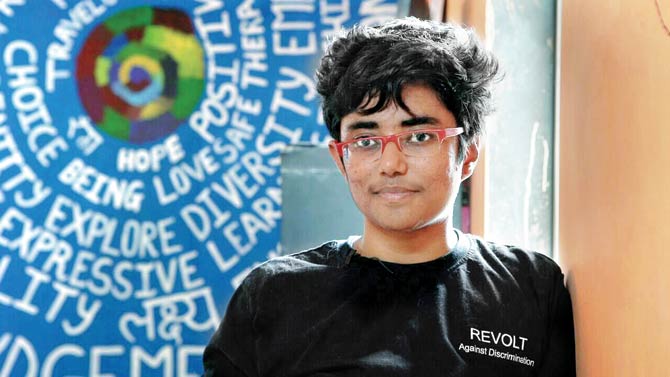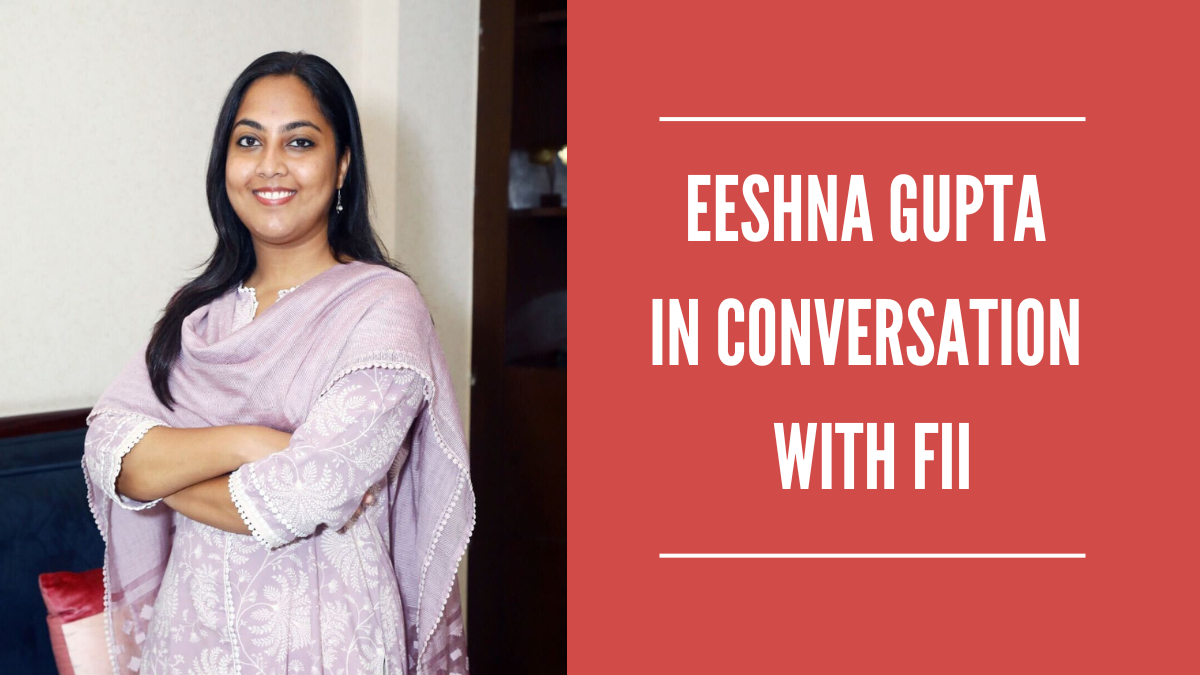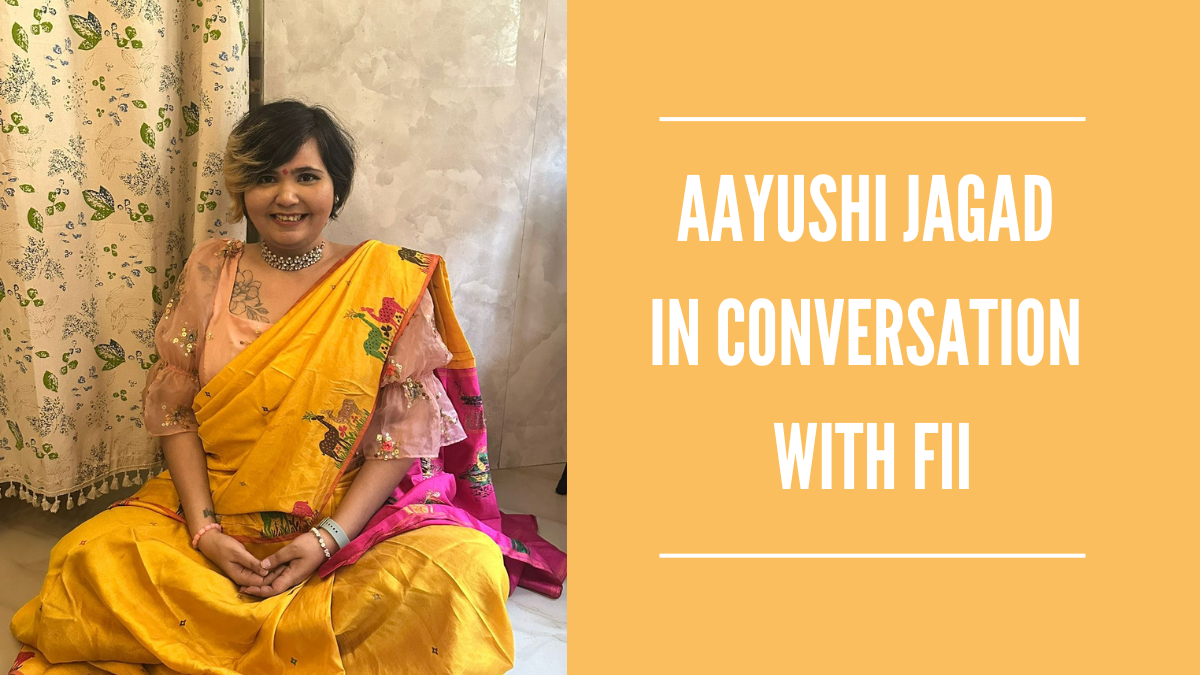Kranti is an NGO based in Mumbai which empowers girls from Mumbai’s red-light districts to become agents of social change. Founder Robin Chaurasiya was recently nominated for the Global Teachers’ Prize, for her unconventional teaching methods and coming up with her own curriculum.
Robin was quick to point the entire credit for the same goes to the girls in the NGO. “It’s the kids”, she said, “with their very exceptional life stories. I am just the vessel in between to connect them with the resources and education opportunities and everything that they need. But yes, it’s not me.”
Shruti: Can you share some stories which you found extraordinary?
Robin: I don’t want to define success in a particular way. Some of the girls pursue their education abroad, some pursue them in India itself. One of the girls won a scholarship to a university in the US 4-5 years ago, she was the first girl to go abroad.
But then, there are a lot of kids who haven’t gone to school, or it is not something that has really worked for them. There was one girl who came to us when she was 17, she had only pursued her education till she was in 7th. After 7th, she started working as a domestic worker.
When she came to us, she had failed 7th standard twice and her therapist recommended not pushing her into doing something she is not interested in and doesn’t want to pursue, rather, let her go ahead with what she is good at. The girl was really into drums and we applied to music schools all over India and no one would take her. They said: “She hasn’t passed her 10th, she won’t fit in”.
So we applied to a few music schools in the US and the UK and everyone accepted her and she got a scholarship to study drums in Washington for nine months. She is back in India and is now a music therapist and uses drums for the purpose of her work.
To me, it doesn’t matter if she has passed class 10th. It’s not so much about success to me than the smile on her face when she is drumming and the fact that she hasn’t passed her 10th doesn’t make her any less of a music therapist.
Then there are a lot of girls who come to us with severe mental health issues. Some girls, who have been trafficked and faced a lot of sexual violence are in therapy. I find these girls inspirational in the sense – they picked up their lives and made something else of it. So considering all the things they have overcome, I think every single kid has an exceptional story.

Image Credit: Your Story
Shruti: What subjects are taught at Kranti?
Robin: So we started off by putting the kids into mainstream schools and the education programs like Teach for India, Pratham and all these different organizations that work for various kids’ needs, but to be honest, I can honestly say none of those programs meets the needs of our kids. Mostly because emotional well being and mental health need to be the focus of whatever we are working on.
A lot of the times the kids are so far behind a lot of these programs are like – 10th pass karwado, 12th pass karwado but I don’t want them to be learning that because that is not the point of education at all. So finally we sat down and asked ourselves – What do we want our kids to know?
One is communication skills, basically how you give speeches and how you communicate your life story to somebody. The second is critical analysis – I think that’s really important and critical to the kind of work we do, that is social justice. Critical thinking and problem-solving is a must for everyone in the world, no matter what you do.
Community leadership – to become an agent of social change in your community or different communities that you are a part of, and the last is compassion. So the idea is we teach a lot of different things and for one month, we went through folktales from around the world about strong women.
So working on these stories also helps in nourishing your English skills but we are also looking at questions like – What did the character do in this situation? Do you agree with the decision the protagonist took? Would you have made a different decision?
The exercise is to write the story from a different characters’ perspective. So you know the idea is to teach compassion through creating empathy for the protagonist by putting yourself in their shoes.
So our curriculum is 20 minutes of Yoga, 20 minutes of meditation, 20 minutes of journal writing and writing one gratitude note for the day. We spend 20 minutes looking at the news to know whats going around the world for current affairs and we also solve puzzles because we don’t do Maths class. The purpose of Maths is logic so we do that instead.
Every day also has a theme, we have Music Monday, TEDxTalk Tuesday, Wordly Wednesdays, Thinking Thursdays and Field Trip Fridays. Field Trip Fridays are generally if there is a film festival for the day or something like one day they had to pick up the trash along with the trash pickers.
In these situations, they get to learn and interact with people from all over, so they experience things and have perspective. Our school runs from 8-12 and from 12-6 they have mainstream school. Any school that is set for marginalized kids is not teaching them what is important, particularly for girls coming from this background.
Shruti: The stigma around sex work largely comes stigma around sex in our society. How do we address it?
Robin: Well, that’s a hard thing because we do have some girls who have issues with sex because of their past. We are very pro-sex work and pro-sex workers’ rights. The dialogue around sex work is such that everyone assumes that everyone in sex work is trafficked.
We are very open to the fact that we are all for sex workers’ rights. There is this girl who is really big on ID and documentation for sex workers and getting them to vote, so she has taken up all kinds of initiatives. She also helps them in opening bank accounts.
Nobody is going to come and sit and have coffee with sex workers, you know. So its a very different perspective in the way these girls see their communities and they love their community. I think the first step is to make people see them as regular people. The interaction is important to get rid of the stigma.
They are just like you and me, whether its sex workers, whether it’s the kids or anyone from that community. Even with men in that community, everyone has this assumption that everyone is a pimp or a trafficker. But some of them take care of these girls, these girls call them Bhaiyas.
Shruti: Can you tell me what is the current situation in our country regarding the rights of sex workers?
Robin: So sex work is technically legal, and its solicitation is not. But, doing sex work is as good as being illegal because even if you are doing sex work, you can get picked for solicitation. Especially for women who are soliciting, its unfortunate because of intersectional marginalisation.
It’s always the poorest of the sex workers who stand on the street and have to pick up customers this way. Now for people who are English speaking and use technology, it’s a lot safer, but still, the raids come into the picture no matter what kind of sex work you are doing. The absolute worst part is a lot of the sex workers’ don’t know their rights, they don’t know how to retaliate.
You have to pay a huge sum of money if you need to get out of jail and if you are a call girl who only makes a decent amount of money, you cannot afford that. If you cannot afford it you would have to sleep with somebody to get out. They are taken advantage of because of their illiteracy and their lack of knowledge about their own rights. There is a lot of work that needs to be done with the police.
But there are 2-3 good examples. There is an organisation called VAMP which is just on the border of Karnataka and Maharashtra. It is one of the most amazing sex-workers unions in the world – and Kolkata has the worlds’ largest sex workers union as well.
The woman who runs VAMP on the Karnataka border is this incredible woman. A school wasn’t accepting her kids and she just went inside the Principal’s office and said “I am not moving” and she sat there for three days and finally they had to admit the kids.
Even the police called them to ask if there is anything that needs to be taken care of. It really is amazing because we have such a bad situation for sex workers in the rest of the country, and then there is one beacon of hope which happens to be one of the best organisations in the world.

Image Credit: The Hindu
Shruti: You were nominated for the Global Teachers Prize for your work with Kranti. Can you tell us about it?
Robin: It was really cool for the kids because they got to go to Dubai. It was amazing because if you look at all the people who were nominated and made it to the top 10 since the prize started, they are mostly mainstream teachers who are doing something different in mainstream schools.
It is appalling what they teach our kids in schools, especially poor kids and try to pass it off as education. And then maybe Teach For India comes along, how many kids do they reach? Barely anyone.
To me, the class should be fun and it should be relevant to your life. It should let you find the things you are good at and encourage you to be able to pursue them. It’s not just about science or maths and we don’t all have to do those things.
To me, education is all about using your brain and having fun using it. On Monday, Tuesday and Wednesday I teach. Thursday is my chutti (day off). We have a guest speaker on Thursday and Friday there is the field trip.
Shruti: What you said about Teach for India is fascinating, because they are in fact only based in urban areas and the fellows are mostly upper-caste graduates from prestigious universities.
Robin: So I made myself a promise to stop complaining about them. I was married once upon a time and my partner worked for Teach for America. She was a city director and that was where my non-favourable opinion started.
It’s this copy-paste thing, where they picked it up from there and pasted it all over the world – white graduates from Harvard, Stanford and Yale, in order to help the poor become a fellow. But the fact of the matter is you are carrying a particular curriculum, you are carrying a particular perspective when you go into the classroom and you are still teaching them that Columbus is a hero and you are still celebrating slavery.
I have a kid in the NGO who got a scholarship to a university in the UK. So many schools in India rejected her, a lot of schools started by Teach For India graduates because she is not really caught up and stuff. You don’t need to catch up to people – you are who you are and this girl spent six months in the US in this program where what they do is teach you one on one and passed in eighth-grade level maths.
She has also done languages, she spent one year in Urdu, one year in Telugu, one year in Tamil, one in Marathi and one in English. How are you possibly going to say this kid needs to catch up or whatever? She speaks, reads and writes in all these languages. This girl, she got selected for a leadership program in Los Angeles and it was a 3-month program, followed by a project when you go back to your community.
Teach For India and Akanksha have been around for so long that, and well, I find it very sad. I went for the one-month teaching program, it was outrageous. So during the ceremony, it pissed me off actually, I mean they talk to the kids and have them come up on stage and everything and tell them – “You guys can dream and become doctors because Teach for India is here”.
Then the fellows get on stage and they tell the fellows you are the future policymakers and decision makers of this country because the fellowship is actually for them. All I could think was why are my kids not the future lawmakers, policymakers and leaders of the country for you?
Let’s be honest, the implication is we are doing the social work and we are up here and you are down there. And if you are going to come up here we are going to have a problem. My kids deserve to get Harvard and Oxford just as much if not more than rich kids of India.

Image Credit: India Times
Shruti: Do you think the fellowship is catering to upper-caste guilt?
Robin: Let’s be honest, that’s who the fellowship is for. Its something that looks good on their resume, same goes for Teach for America. I am not saying they are bad teachers, some of them are very good teachers.
But so much money is spent on them and less is spent on the kids. Yes, these kids will be eligible for certain jobs but they may not necessarily come out of the cycle of poverty. Getting a job at Starbucks might help you, but it’s not going to change your life.
Shruti: My last question to you is – Where do you see Kranti in the next five years?
Robin: I see myself retiring, I am old and I need a break. So the oldest girls in Kranti are 22 and 23, four of them have gone to universities and four of them are interning. I want them to take over and I will probably have a house in the mountains.
The way mainstream education is structured right now is from the industrial era. As of now, it feels like a punishment. Education should be fun and include those who are differently abled and differently talented.
We have a girl who can’t speak. So the whole class speaks in sign language. The current categories in education are not adequate enough. Anyone who has worked with kids knows how much fun it can be and how much diversity they bring to the classroom.
We have learned that kids need to be separated based on age – actually not true. Every kid has something to add. We have kids in our NGO who are 18 and have never been to school, and there are kids who are 18 and going to university. The point is – we need to have space for everyone who wants to be who they are and not shame them for it. I am 32, and I am not as far as some of the girls are.
Also Read: In Conversation with Hasina Kharbhih: Tackling Trafficking Systematically
Featured Image Credit: Firstpost
About the author(s)
Holden Caulfield thinks you are a phony.




